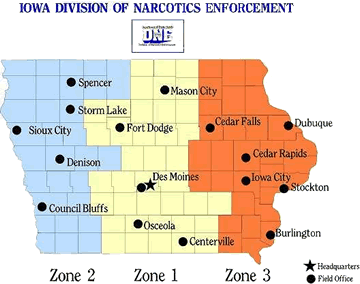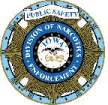 |
 |
 |
Created in 1987, the Division of Narcotics Enforcement (DNE) was established to serve as the lead agency in the state providing public safety through investigative enforcement of laws relating to narcotics and other controlled substances. In addition to targeting major distributors/sources of controlled substances the Division is actively involved in the investigation of drug-related financial conspiracies, clandestine laboratories, marijuana eradication, the diversion of pharmaceuticals, gang-related activities, and assistance in drug interdictions. Successful investigations and prosecutions of drug cases are due in large part to the Division's cooperative efforts with other local, state, and federal law enforcement agencies. |

|
|
The
Division of Narcotics Enforcement, directed by Ken Carter, has 41 sworn
officers and 14 civilian employees. This includes 6 non-sworn employees
assigned to the Department of Public Safety Intelligence Bureau and paid
with Division of Narcotics funds. Director Carter is a graduate of Central Missouri State University. He was a commissioned officer with the U.S. Army Military Police prior to joining the Department of Public Safety in 1975. Carter has served as the Division of Narcotics Enforcement Director since 1994. |
| The Division of Narcotics Enforcement has sixteen offices throughout the state, including its headquarters in Des Moines. Special Agents initiate investigations on major drug traffickers who supply controlled substances that are sold and used in Iowa. Additionally, agents respond to requests from local jurisdictions and task forces for assistance with their cases. Many investigations are also coordinated and conducted in cooperation with federal and out of state law enforcement agencies. |
|
The Division provides drug-related training to state, county, and city law enforcement, often with the cooperation and support of other local, state, and federal personnel. The Division also serves as the central repository for special purpose monies that are disseminated to authorized agencies and/or personnel. In
addition to the investigative and enforcement services provided by the
Division, the DNE coordinates other resources and services with the
Governor's Office of Drug Control Policy (ODCP), the Iowa National Guard,
the Department of Defense, and the Midwest High Intensity Drug Trafficking
Area (HIDTA). Although the focus of DNE's investigative efforts are on methamphetamine, powder and crack cocaine, and marijuana trafficking, there has also been an emerging threat with designer or club drugs (i.e., Ecstasy, GHB, and LSD, etc). During fiscal year 2002, DNE seizures of some controlled substances decreased; however, seizures of cocaine increased from 4,536.1 grams in 2001 to 8,834.2 grams in 2002 an increase of approximately 95%; crack cocaine seizures increased from 1,075.5 grams in 2001 to 2,012.7 grams in 2002, for an increase of approximately 87%; and methamphetamine seizures increased from 30,005.9 grams in 2001 to 86,385.5 grams in 2002, for an increase of approximately 188%. |
Items Seized By the
Division of Narcotics Enforcement During FY 2002
| Cocaine |
8,834.2 grams
|
| Crack Cocaine |
2,012.7
grams
|
| Esctasy |
1,358
D.U.s *
|
| GHB |
77
ounces
|
| Ephedrine |
5,790.7
grams
|
| Hashish |
17.1
grams
|
| Heroin |
1.6
grams
|
| LSD |
440
D.U.s *
|
| Marijuana |
39,124.7
ounces
|
| Marijuana Plants |
17,243
**
|
| Methamphetamine |
86,385.5
grams
|
| Rifles |
44
|
| Shotguns |
56
|
| Handguns |
39
|
| Vehicles |
48
|
| Cash |
$2,700,514.00
|
| * D.U.s = dosage unit |
**
includes cultivated & uncultivated plants
|
Clandestine
Laboratory Emergency Response Team
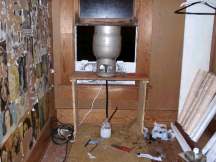 |
. |
The manufacture of methamphetamine has been increasing in Iowa since the early 1990's. Chemicals used to manufacture methamphetamine present environmental and explosive hazards to areas surrounding the sites. To ensure the safety of both the officers and neighboring citizens, it is essential that well-trained individuals dismantle and remove these illegal laboratories. | 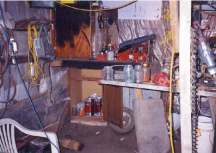 |
|
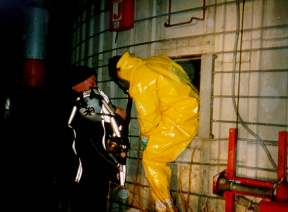 |
|
|
During the 2002 fiscal year, the Division of Narcotics Enforcement received federal funding to purchase three lab response vehicles. These vehicles store and transport the necessary equipment needed to respond to clandestine methamphetamine laboratory sites. One truck is assigned to each DNE Zone (Council Bluffs, Osceola, and Muscatine). |
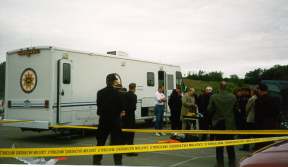 Federal funds enabled the DNE to purchase three lab response vehicles during FY 2002. |
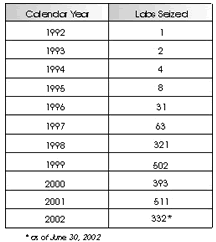 |
It should be noted that during the 2000 calendar year, several county and municipal law enforcement officers received clan lab certification training. This allowed many agencies to respond to their own lab sites and as a result, from that point on the total lab seizures in the state were comprised of DPS CLERT seizures and local Iowa law enforcement agency seizures. The lab seizures included in the following table from calendar year 2000 to present only reflect the DPS CLERT methamphetamine lab seizures. |
South Central Iowa Clandestine Laboratory Enforcement Task Force
|
During the previous two fiscal years, FY 2000 and FY 2001, the number of clandestine methamphetamine labs continued to increase in the south central Iowa area. This created a significant burden on the resources of the Department of Public Safety's Clandestine Laboratory Emergency Response Team (CLERT), and other OSHA certified clandestine lab investigators. As a result, in November of 2001, the Division of Narcotics Enforcement received federal monies to coordinate the formation of a task force whose mission was to implement a cooperative enforcement strategy to measurably reduce the manufacture and distribution of methamphetamine in south central Iowa. The task force initially encompassed the following seventeen counties: Story, Dallas, Polk, Jasper, Madison, Warren, Marion, Union, Clarke, Lucas, Monroe, Wapello, Ringgold, Decatur, Wayne, Appanoose, and Davis counties. Mahaska County joined the task force in June of 2002. The funding received was utilized for lab training, OSHA specified physicals, equipment, salaries, benefits, and overtime for eight (8) fulltime personnel; including seven (7) sworn agents/officers (two agents from DNE and five from county and municipal agencies), and one (1) support person. Additionally, some lab response equipment and overtime monies are provided to thirteen (13) part-time sworn officers/task force members. Analytical support is provided through the Iowa National Guard Counterdrug program. The task force responds
to clandestine labs within the eighteen county area, and emphasis is
also placed in conducting proactive investigations and sharing intelligence
information. Additionally, task force officers conduct lab awareness
training in the south central Iowa area. The Division of Narcotics Enforcement
serves as the lead agency of the task force, with oversight provided
by the Clandestine Lab Emergency Response Team (CLERT) Special Agent
in Charge. |
| Marijuana Eradication |
|
During the 2002 fiscal year, approximately 258 cultivated and 16,985 uncultivated marijuana plants were eradicated in the state of Iowa. This includes marijuana plants seized in indoor and outdoor grow operations. The Division of Narcotics Enforcement continues to work with the Iowa National Guard, county sheriff's departments, police departments, and multi-jurisdictional task forces on eradication efforts. In addition, the
DNE continues to maintain a toll free "hotline" to allow citizens
to report suspected drug and marijuana activity. The hotline has proven
to be a great benefit with tips on drug activity, and for individuals
who wish to cooperate further with the DNE. |
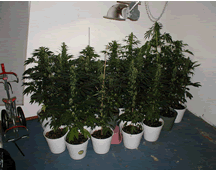 |
Midwest High Intensity Drug Trafficking Area (HIDTA) In February of 1997, Iowa became one of the five Midwest states (Iowa, Nebraska, Missouri, Kansas, and South Dakota) to form the new methamphetamine specific Midwest HIDTA. The Office of National Drug Control Policy (ONDCP) allocated federal monies to five midwestern states to combat the growing methamphetamine epidemic. During FY 1999, North Dakota also joined the Midwest HIDTA. The Midwest HIDTA promotes a comprehensive, cooperative strategy by law enforcement at the federal, state, and local level to meet the problem of methamphetamine and other controlled substances head on. Iowa's HIDTA enforcement initiative is to measurably reduce the amount of methamphetamine distributed in the state of Iowa by coordinating efforts against importation and distribution organizations, as well as against manufacturers of methamphetamine within the state. The DNE serves as the central coordinating agency in Iowa, with the Director of the Division serving as a member of the HIDTA Executive Board, a member of the Drug Demand Reduction Committee, and a member of the Midwest HIDTA Budget Sub-Committee. Those agencies receiving HIDTA funds in Iowa include the United States Attorney's Offices, the Federal Drug Enforcement Administration (DEA), six county and municipal law enforcement agencies, the Division of Narcotics Enforcement, the Division of Criminal Investigation, the Fire Marshal Division, and the Department of Public Safety Intelligence Bureau. During fiscal year
2002, monies appropriated to the DNE maintained five Special Agent positions
and two support personnel. Additionally, monies were utilized to purchase
expendable equipment for the Clandestine Laboratory Emergency Response
Team and undercover purchases and overtime for methamphetamine specific
investigations. |
In addition to conducting investigations during FY 2002, the Division of Narcotics Enforcement provided instruction and training throughout the state for law enforcement officers, dispatchers, and prosecutors. Also, DNE Special Agents provided training and made informational presentations to business and civic leaders, teachers, parents, and school administrators, Department of Human Services case workers, correctional officers, and emergency medical technicians. Approximately 1,277 people received training or information in the following areas: |
| * Drug Interdictions | * Confidential Informant Development & Management | |
| * Drug Conspiracies | * Drug Identification & Law | |
| * Pharmaceutical/Drug Diversion | * Drug Law (related to Diversion) | |
| * Drug Trends |
|
In addition to the above topics, the Division conducted approximately 36 clandestine lab awareness-training programs to 1,197 people, including sworn law enforcement officers, full-time fire fighters, HAZMAT personnel, Department of Transportation road workers, volunteer medical personnel, and volunteer fire fighters. The Division also
conducted one (1) 24-hour Clandestine Lab/First Responder Training Course
in which approximately 18 law enforcement officers received training,
allowing them to respond to and enter a laboratory site if appropriately
equipped. Additionally, the Division hosted and provided training to
approximately 197 law enforcement officers through three (3) 40 hour
Clandestine Lab Certification Schools, one (1) Clandestine Laboratory
Site Supervisor School and four (4) Clandestine Laboratory Re-certification
courses. |
|
Coordinating
Efforts Through the Governor's Office of Drug Control Policy, the Division oversees the dissemination and bookkeeping associated with all undercover funds disbursed to local task forces. In addition, the Division also supports the task forces by supplying seized undercover vehicles and surveillance equipment for investigative operations. With the assistance and resources of the Iowa National Guard, the DNE coordinates analytical support personnel for all of the federal and ten of the state task forces in Iowa. The DNE is the designated
lead agency for the Department of Defense's counterdrug military equipment
program (1033). Military surplus items such as vehicles, kevlar helmets,
weapons, and computer equipment can be obtained through this program.
Application for access to this program must be made to the Director
of the Division, and any equipment obtained through this program must
be utilized strictly for counterdrug efforts.
|


